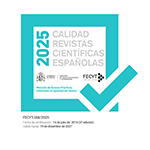Haced como los españoles. Los movimientos de 1821 en Piamonte y el origen del constitucionalismo
Resumen
Aunque no falta una historiografía local de referencia, los movimientos en Piamonte de 1821 todavía carecen de una lectura que otorgue el peso adecuado al aspecto histórico-constitucional. Cuando el revolucionario príncipe de Carignano Carlos Alberto, después de la abdicación de Víctor Emmanuel I, concedió la Constitución abrió una crisis en la historia secular de la dinastía y el reino de Cerdeña: las libertades y los derechos de representación rompieron por primera vez el pacto de fidelidad directa entre el rey y el pueblo característico del Estado absoluto. El nuevo sistema político no era autóctono y, entre los muchos modelos posibles, miraba al de España. Usando la extensa bibliografía disponible, este artículo se adentra en las influencias nacionales e internacionales de ese efímero episodio. Pero no solo eso: también hace hincapié en el origen social y geográfico de los protagonistas de la revolución (entre la nobleza y la burguesía, entre el centro y la periferia del Estado) y las consecuencias de sus acciones. Si la insurgencia fue derribada por las fuerzas realistas convergentes y el ejército austriaco, su legado pesaba sobre la dinastía. En 1823, durante la guerra entre España y Francia, Carlos Alberto se convirtió en el héroe del Trocadero: una elección reaccionaria que influyó en el futuro del monarca de Saboya. Ciertamente la sombra de la constitución de Cádiz acompañó a Carlos Alberto hasta 1848, el año de la concesión del Estatuto. La evolución hacia un texto constitucional más moderado marcará así la temporada política preunitaria. La constitución de Cádiz se convirtió en un símbolo de libertad con el tiempo, y los exiliados de 1821 fueron a luchar en Europa por los pueblos oprimidos por la Santa Alianza.
Descargas
Descarga artículo
Licencia
Aquellos autores/as que tengan publicaciones con esta revista, aceptan los términos siguientes:
a. Los autores/as conservarán sus derechos de autor y garantizarán a la revista el derecho de primera publicación de su obra, el cuál estará simultáneamente sujeto a la Licencia de reconocimiento de Creative Commons Reconocimiento-No comercial-Sin obra derivada 4.0 España que permite a terceros compartir la obra siempre que se indique su autor y su primera publicación esta revista.
b. Los autores/as podrán adoptar otros acuerdos de licencia no exclusiva de distribución de la versión de la obra publicada (p. ej.: depositarla en un archivo telemático institucional o publicarla en un volumen monográfico) siempre que se indique la publicación inicial en esta revista.
Plagio y fraude científico
La publicación de un trabajo que atente contra los derechos de propiedad intelectual será responsabilidad de los autores/as, que serán los que asuman los conflictos que pudieran tener lugar por razones de derechos de autor. Los conflictos más importantes pueden darse por la comisión de plagios y fraudes científicos.
Se entiende por plagio:
1.Presentar el trabajo ajeno como propio.
2.Adoptar palabras o ideas de otros autores sin el debido reconocimiento.
3.No emplear las comillas u otro formato distintivo en una cita literal.
4.Dar información incorrecta sobre la verdadera fuente de una cita.
5.El parafraseo de una fuente sin mencionar la fuente.
6.El parafraseo abusivo, incluso si se menciona la fuente.
Las prácticas constitutivas de fraude científico son las siguientes:
1.Fabricación, falsificación u omisión de datos y plagio.
2.Publicación duplicada.
3.Conflictos de autoría.












